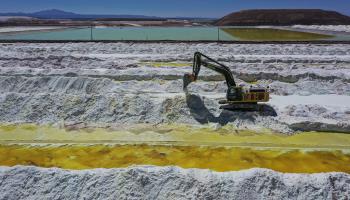A joint venture between state-owned copper company Codelco and private company SQM has gained initial approval
On April 24, antitrust regulators approved a joint venture between the state-owned copper company Codelco and the private Chilean company SQM, following a nine-month review. This is a significant boost to President Gabriel Boric’s National Lithium Strategy, announced in 2023, which aims to increase production while strengthening state control over lithium. Strong interest in other lithium projects suggests growing momentum, but hurdles remain for both the Codelco-SQM deal and the sector as a whole.
What’s next
Subsidiary Impacts
- Increased human activity could damage fragile salt flat ecosystems.
- Endangered species such as the endemic Karachi fish could become extinct.
- Slow progress and poor execution in lithium projects could discourage investment in other industries such as green hydrogen.
Analysis
Codelco and SQM have been granted permission to form a joint venture in which the state-run firm will hold a majority stake of 50% plus one share. The company will mine and sell lithium from the Atacama Salt Flat in the north of the country and is forecast to start operations this year.
To do so, it must still receive approval from Chile’s nuclear energy commission (CCHEN), which is expected to grant it later this year. However, it also still requires approval from Chinese regulators. This could prove to be more challenging given the fact that Chinese firm Tianqi, which owns a 20% stake in SQM worth around USD4bn, has taken legal action to halt the deal (see CHILE: Concerns over China dependence will mount – June 5, 2024). While Chile’s Supreme Court rejected an appeal from Tianqi in September 2024, Chinese regulators could be more sympathetic as the joint venture will effectively sideline Tianqi in favour of the Chilean state.
Chinese pushback against the deal is likely
Some Chilean lawmakers have also opposed the deal. In a report published on May 20, a congressional commission called for the deal to be halted, citing a lack of transparency.
Strategy gains momentum
Despite this, proponents of the current strategy argue that there are signs of growing momentum behind the National Lithium Strategy, which aims to establish public-private partnerships to enhance lithium production and advance up the value chain by attracting investment in processing and battery manufacturing facilities.
There has been strong interest from international companies after the government opened up new areas to lithium projects, bringing the number up from six to twelve, and introduced an expedited process for awarding contracts to companies that meet certain requirements, including ownership of the concession in question, adequate financial capacity and relevant experience.
For example, on May 19, Codelco announced that it had selected UK-Australian mining giant Rio Tinto as its partner in a joint venture to exploit the Maricunga salt flat, with the firm to invest up to USD900mn, pending regulatory approvals.
Rio Tinto is also on the shortlist of potential partners for projects in the Salares Antoandinos salt flat, while the French firm Eramet is exploring a consortium with Codelco and the Chilean firm Quiborax for a project at Salar de Ascotan.
Indian firm Coal India, which has resumed talks over a joint venture, and US firms ExxonMobil and SLB are also reportedly interested in Chilean projects.
Potential and pitfalls
Recent studies indicate that Chile’s total lithium resources are 28% greater than previously estimated, at 14 million metric tons (see LATIN AMERICA: Lithium hopes may prove exaggerated – November 5, 2024).
Chile also has many comparative advantages, including accessible and highly concentrated lithium resources and low production costs. However, prospective partnerships all face the same structural issues.
Regulatory roadblocks
The legal framework surrounding lithium extraction has slowed progress, despite the National Lithium Strategy. Lithium is designated a strategic mineral not subject to mining concessions, which means that concessionaires can exploit all minerals in a block apart from lithium. Now, the state has begun issuing contracts to produce lithium, known as CEOLs, many of which overlap with existing concessions. This raises the risk of legal conflicts if both parties want to mine in the same area. The legal process for choosing partners in these joint ventures has also been criticised for a lack of transparency.
Lithium production contracts may come into conflict with existing mining concessions
Critics also highlight overbearing bureaucracy and the slow pace of acquiring the necessary permits, although a recent reform aims to facilitate this process (see CHILE: Permitting reforms seek to boost investment – December 11, 2023).
Local opposition
Lithium extraction projects face considerable opposition from local indigenous communities and environmental activists due to concerns over water use.
Codelco and SQM are consulting with local indigenous communities on a so-called governance plan, which would give them more influence over lithium extraction projects. This plan includes regular dialogue aimed at keeping the new joint venture accountable for pledges, such as increasing production by boosting efficiency and utilising new technology, rather than relying on more water or brine.
While discussions with local leaders could slow development, and stricter environmental standards could reduce profits, this approach aims to head off anti-mining protests that could easily disrupt operations at the isolated facilities. It could also help Chile export lithium products to markets increasingly concerned about sustainability, such as the EU, which launched a project known as OPTIMINER in April that is designed to optimize the extraction and processing of critical raw materials, including lithium, in Chile.
Codelco constraints
At the same time, while Codelco is vastly experienced in copper mining, it lacks expertise in lithium extraction. The company is also heavily indebted, which could affect its ability to fund the planned operations.
Volatile prices
The price of lithium has been highly volatile and has fallen sharply over the last few years. It may also come under further pressure due to the development of sodium-ion batteries and growth in lithium-ion battery recycling programmes (see INT: EV battery tech race may upset China’s dominance – December 9, 2024).
Value-added obstacles
In addition, efforts to move up value chains suffered a blow in May when Chinese automaker BYD and metals group Tsingshan both announced that they were withdrawing from projects to develop a lithium processing plant and a battery manufacturing facility in Chile (see CHILE: Lithium disputes may mean a missed opportunity – February 11, 2022). Although the government had agreed to sell lithium at preferential prices, the firms ultimately decided against investing due to changing market conditions and the trade war between the United States and China (see LATIN AMERICA: Chinese investment will be selective – October 30, 2023).
Outlook
While Chile could benefit from great power competition for lithium supplies, other countries are also ramping up production, including neighbouring Argentina and Australia, which has overtaken Chile as the number one global supplier of the metal. Both countries are seen as having more favourable legal frameworks, although legal security in Argentina remains a risk.
Boric’s National Lithium Strategy has made limited progress due to structural issues that have held back lithium projects. Without reforms to accelerate project development, it appears that Chile’s share of global lithium production will continue to decline. Although a new government may introduce policies that can breathe new life into the industry, new projects will likely lead to social conflicts due to concerns over environmental impacts, while low lithium prices could limit state revenues.



